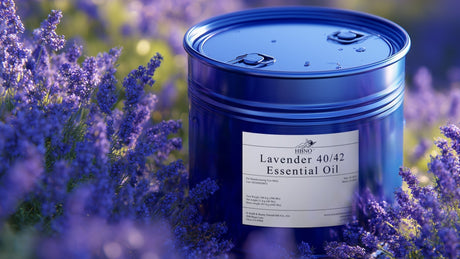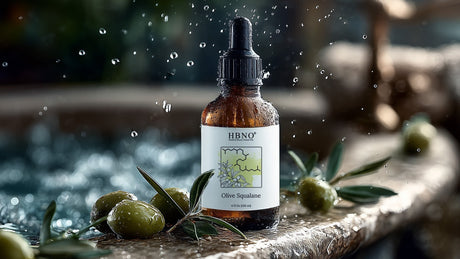Coconut oil has gained massive popularity in recent years for its many uses, particularly in the beauty and skincare industry. Whether you're cooking with it, using it in your hair care routine, or applying it directly to your skin, coconut oil seems to be a multi-tasking wonder ingredient. But when it comes to oily skin, many wonder if it's a suitable choice for skincare. In this blog, we'll dive deep into whether coconut oil is good for oily skin, how to use it effectively, and what you can expect from incorporating it into your daily skincare routine.
We'll also distinguish between regular coconut oil and its fractionated form, Coconut Oil Fractionated MCT (Medium Chain Triglyceride), which may offer some specific benefits for those with oily or acne-prone skin. Read on to learn everything you need to know about coconut oil for oily skin and how it can enhance your skincare regimen.
Understanding Coconut Oil: The Basics
Before diving into how coconut oil works on oily skin, it's essential to understand what it is and why it's so popular in skincare.
Coconut oil is a natural oil extracted from the meat of coconuts. It's rich in saturated fats, particularly medium-chain triglycerides (MCTs) like caprylic acid, capric acid, and lauric acid. These MCTs are metabolized differently than long-chain fatty acids, which makes coconut oil easily absorbed by the body.
When applied topically, coconut oil can nourish and hydrate the skin, providing an immediate moisture barrier. It also has antimicrobial properties that make it an excellent natural alternative for treating acne and other skin irritations.
What Is Coconut Oil Fractionated MCT?
Fractionated coconut oil is a more refined version of coconut oil that undergoes a process called "fractionation." This process removes the long-chain fatty acids from the coconut oil, leaving behind the medium-chain triglycerides (MCTs) that remain in liquid form at room temperature. Fractionated coconut oil is odorless, lighter in texture, and more stable than regular coconut oil, which can solidify at lower temperatures.
Coconut Oil Fractionated MCT is often favored by skincare enthusiasts and beauty brands for its smoother consistency and non-greasy feel. It is known for being particularly beneficial for those with oily or acne-prone skin because it doesn't clog pores as regular coconut oil might. If you're worried about breakouts or excess oil production, Fractionated Coconut Oil might be a more suitable choice.

Coconut Oil for Oily Skin: Benefits and Myths
The idea of using oil on oily skin might sound counterintuitive, especially since many people with oily skin are constantly seeking ways to reduce oil production. However, coconut oil, including Fractionated MCT, can offer several surprising benefits for those with oily skin.
1. Hydration Without Clogging Pores
Coconut oil can act as a moisturizer without clogging pores. While it might seem counterproductive to add more oil to your skin, using the right type of oil can help balance oil production. For those with oily skin, hydration is just as essential as oil control. Coconut oil forms a thin layer over the skin, locking in moisture without being too heavy or greasy.
Fractionated coconut oil, with its lighter consistency, is especially good at absorbing quickly into the skin, making it an excellent choice for those who are wary of traditional coconut oil.
2. Anti-Inflammatory and Antioxidant Benefits
Coconut oil contains antioxidants, such as vitamin E and polyphenols, that help reduce inflammation in the skin. This can be especially beneficial for those who suffer from acne or other inflammatory skin conditions like eczema or psoriasis. These antioxidants work to soothe the skin and promote a healthy, radiant complexion.
Additionally, coconut oil's anti-inflammatory properties can calm redness or irritation caused by acne, helping the skin heal more quickly.
3. Natural Acne-Fighting Properties
One of the standout benefits of coconut oil is its ability to fight acne. This is thanks to lauric acid, one of the main fatty acids found in coconut oil. Lauric acid has antimicrobial properties that can help combat acne-causing bacteria, making it an excellent option for people with acne-prone skin.
When applied topically, coconut oil can kill bacteria on the skin, preventing breakouts and reducing the severity of existing pimples. For those suffering from acne due to excess oil production, using coconut oil in moderation can help strike a balance between hydrating and preventing acne-causing bacteria.
4. Gentle Makeup Remover
Coconut oil can also serve as an effective makeup remover, including the removal of waterproof mascara and long-lasting foundation. Its oil-soluble nature allows it to break down makeup and dirt from the skin, cleansing your face without harsh chemicals. It is gentle enough for even sensitive skin types, making it an excellent all-in-one product for those with oily skin.
5. Non-Comedogenic Nature of Fractionated Coconut Oil
One of the most significant concerns with using coconut oil on oily or acne-prone skin is the risk of clogging pores. Regular coconut oil, due to its heavier texture, can clog pores, leading to further breakouts. However, Fractionated Coconut Oil is much lighter and less likely to clog pores, making it an excellent choice for those with oily skin. This non-comedogenic feature of Fractionated Coconut Oil is one of the reasons it is so popular among individuals with acne-prone skin.
How to Use Coconut Oil for Oily Skin
If you're considering incorporating coconut oil into your skincare routine, it's essential to use it properly to get the most out of its benefits. Here's how you can use coconut oil for oily skin:
1. As a Cleanser
If you're struggling with oily skin, you can start using coconut oil as a gentle cleanser. Coconut oil can break down excess oil, dirt, and makeup on the surface of your skin, all while hydrating and nourishing. Simply apply a small amount of oil to your face, massage it in for about a minute, and then wipe away with a warm, damp cloth. This will leave your skin feeling soft, clean, and moisturized.
For those with more sensitive skin, you may want to opt for Fractionated Coconut Oil as it is lighter and less likely to clog your pores.
2. As a Moisturizer
Once you've cleansed your face, you can apply coconut oil to lock in moisture. For oily skin, a little goes a long way. You only need a small amount to hydrate your skin without feeling greasy. Massage the oil gently into your skin, focusing on any areas that tend to get drier, like around the eyes or mouth. Fractionated Coconut Oil is ideal as it's much lighter, providing the hydration without the heavy, greasy feel that some people experience with regular coconut oil.
3. As a Spot Treatment
If you have active breakouts, you can apply coconut oil directly to the affected areas as a spot treatment. The antimicrobial properties of coconut oil, specifically the lauric acid, help combat acne-causing bacteria and promote healing. Apply a tiny amount to the pimple before bed and let it work its magic overnight.
4. As a Night Mask
Another excellent way to use coconut oil for oily skin is by applying it as an overnight mask. This can be especially beneficial if you have areas of dry skin or need extra moisture. After cleansing, apply a thin layer of coconut oil over your face, and allow it to work its way into your skin overnight. Fractionated Coconut Oil is great for this since it won't leave your skin feeling too oily when you wake up.

What to Expect from Using Coconut Oil for Oily Skin
When you begin using coconut oil for oily skin, you may notice a variety of effects. The results depend on how well your skin reacts to the oil, the type of coconut oil used, and how often you apply it.
1. Balanced Moisture Levels
In the short term, you should expect a noticeable difference in your skin's moisture levels. Coconut oil works by hydrating and locking moisture into the skin, preventing it from becoming too dry or flaky. This balance helps regulate oil production over time.
2. Clearer Skin
For those with acne-prone skin, incorporating coconut oil into your routine can lead to clearer skin over time. The antimicrobial properties of coconut oil will reduce the buildup of acne-causing bacteria, resulting in fewer breakouts.
3. Softer, Smoother Skin
Coconut oil is rich in vitamins and fatty acids, which nourish the skin and promote a healthy, glowing complexion. Expect softer and smoother skin as coconut oil helps repair and rejuvenate your skin's surface.
4. Potential Breakouts
While many people see benefits, others may experience breakouts. Coconut oil is not universally effective for everyone, especially for those with excessively sensitive skin. If you find that your skin reacts negatively to coconut oil, discontinue use and opt for a lighter product such as Fractionated Coconut Oil.
Conclusion: Is Coconut Oil Right for Oily Skin?
Coconut oil, particularly Fractionated Coconut (MCT) Carrier Oil, can be an excellent addition to your skincare routine for oily skin. It provides hydration, helps balance oil production, and offers natural antimicrobial benefits that can combat acne. However, it's important to be mindful of the type of coconut oil you choose and how often you apply it. If you have concerns about clogged pores or acne, opting for Fractionated Coconut Oil may be the better choice.
If you're unsure whether coconut oil is right for your skin, it's always a good idea to consult with a dermatologist before incorporating it into your routine. With the right application and expectations, coconut oil can help maintain healthy, hydrated skin while addressing the challenges of oily skin.
Partner with a Custom Private Label Solutions delivering high-quality, market-ready products.



